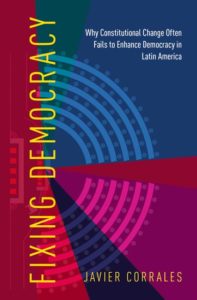Latin America’s democratic resilience: institutional innovation beats populism

Democracy spread to every country except Cuba and has survived in every one except Venezuela and Nicaragua (and possibly Honduras and Bolivia) because Latin American societies have learned to bolster the line of defense against democracy’s internal enemies, adds Corrales, a contributor to the NED’sJournal of Democracy. They’ve done it through institutional innovation, he writes for The New York Times: Latin America’s Populist Revival The center appears to be collapsing across Latin America, notes the Chicago Council on Global Affairs. In Colombia, Ivan Duque’s tough stance on the FARC peace deal and the economy swept him into office in June. Andres Manuel Lopez Obrador’s left-wing populism delivered a historic electoral victory in Mexico this past July. And Jair Bolsonaro’s outspoken, far-right platform has made him a frontrunner for Brazil’s presidential election in October. Twenty years after Hugo Chavez took power with a populist agenda, Venezuela is in turmoil. Will this new wave deliver on their promises to tackle the region’s corruption and inequalities? And how will these elections affect relations with the Unites States? These questions are addressed by (below): Roberta S. Jacobson, Former Ambassador of the United States to Mexico Peter Schechter, Founder, Altamar Joel Velasco, Principal, Albright Stonebridge Group. Moderated by Juliana Kerr.Latin America’s democratic resilience: institutional innovation beats populism
 The resilience of democracy in Latin America is impressive, notes Javier Corrales, a professor of political science at Amherst College, and author of “Fixing Democracy: Why Constitutional Change Often Fails to Enhance Democracy in Latin America.”
The resilience of democracy in Latin America is impressive, notes Javier Corrales, a professor of political science at Amherst College, and author of “Fixing Democracy: Why Constitutional Change Often Fails to Enhance Democracy in Latin America.”
